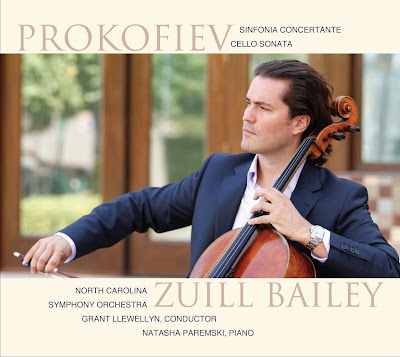Cellist Zuill Bailey repeats almost exactly the formula that won raves from the critics in his 2014 Telarc recording of cello music by Benjamin Britten. That included the Symphony-Concerto and a Cello Sonata, as does this new Steinway disc of music by Sergei Prokofiev, due to be released on April 29, 2016. Bailey has the same supporting cast as well: the North Carolina Symphony conducted by Grant Llewellyn, and in the Sonata, pianist Natasha Paremski. The concerted works of both discs were recorded live at the Meymandi Concert Hall in Raleigh, while the sonatas come from the studio.
Way back in 2002 Bailey gave a wide-ranging interview with Tim Janof of the Internet Cello Society, in which he talked about the cello recordings that he especially loved. I'm not surprised with his choice of Rostropovich's famous recording of the Sinfonia Concertante with the Royal Philharmonic Orchestra and Sir Malcolm Sargent. Bailey and Llewellyn follow the great Russian/English team in terms of tempi, which tend to be a bit brisker than other recordings (especially Ma's, with Maazel in Pittsburgh). The cello is brought quite far forward, front and centre, in the recording, though, putting the emphasis more on the Concertante than the Sinfonia. It's an especially fine live recording, though, with that electric feeling you sometimes get in the concert hall. There's no sign of the audience, even at the end, which is different from the nine minutes of applause included in the latest recording from Atlanta.
This great work is extremely well served on disc. I listened to bits of a dozen versions, and all of the Rostropovich, Ma, Harrell, and Wallfisch, and marvelled at the way great and modest cellists could differ in small and large ways while still sounding so musical. The lovely tone of Bailey's venerable instrument - the 1693 Goffriller played by Mischa Schneider for three decades in the Budapest String Quartet - and Bailey's confident mastery of the work, puts this recording in the same league as those masters, with the very fine orchestral playing of the Carolinians very nearly up to the Royal Philharmonic, Pittsburgh or Liverpool orchestras.
I shouldn't forget the 1949 Sonata, which is fine indeed. Prokofiev, who had recently been charged with formalism in music, did not know if he'd ever have his music performed again, or worse. So he forgets about impressive effects to wow the audience; this is more like a personal working out of things in his brain. And what a brain! Bailey and Paremski (again, an equal musical partner) keep their eyes down and the feeling intense, eschewing obvious effects in favour of the work's bleak architecture.
In the world of the recording star you're always moving on to the next project. I follow Bailey on Twitter (as should you), and on April 16, 2016 he tweeted about the latest live recording project with the North Carolina Symphony, conductor Grant Llewellyn, and violinist Philippe Quint: the Brahms Double Concerto. I'm looking forward to this recording!
 |
| Bailey, Llewellyn & Quint with the NC Symphony, from Bailey's Facebook page. |

No comments:
Post a Comment